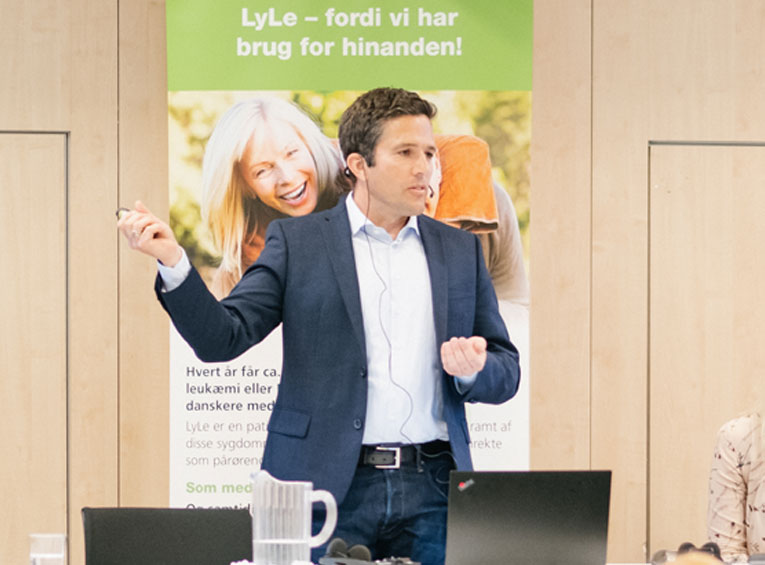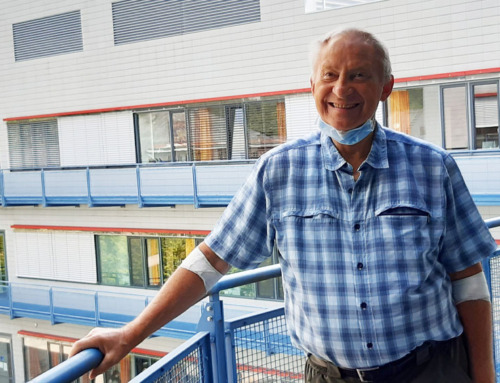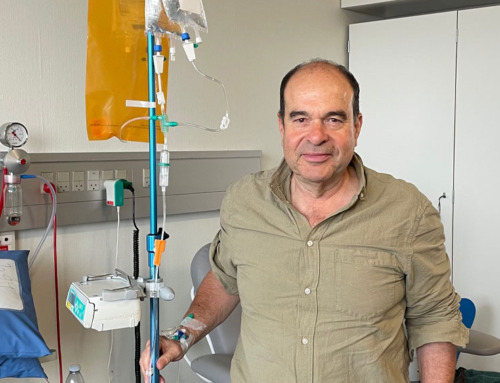Artiklen er på engelsk – findes også på dansk under overkriften: CLL-behandlingen står i et vadested
That is how Carsten Niemann, chief physician at Rigshospitalet in Copenhagen, describes the situation in the treatment of CLL right now. A disease in which several new targeted treatments have come into play with the potential to replace the conventional chemo-immunotherapy treatment. Carsten Niemann is heavily involved in scientific studies that investigate the use of both new and old drugs for the treatment of CLL. At the CLL conference taking place in Copenhagen April 25, we had the opportunity to talk to him.
What is the status of the knowledge we have of CLL and the treatment of the disease?
“We are in a transition phase – standing with the choice between the older, proven and – mostly – effective treatments and the new, more targeted drugs. In 2010, for the first time, we were able to improve survival rates with chemo-immunotherapy (i.e. the combination of chemotherapy and antibodies). So, you cannot say that chemo-immunotherapy is an old treatment, but today we have new substances that have proved very effective. When I call it a transition phase, it is because we do not yet know enough about in what order and in which combinations, we should use these new treatments – and exactly which patients should have it. We know that patients who have a deletion 17p or TP53 mutation should not receive chemotherapy, but would benefit from the new, targeted treatments. This can be seen as the first sign of moving towards a very high degree of personalized treatments and that is the way to move forward. We still need to get better at giving the right treatment to the right patient at the right time.”
Which trials are currently going on in Denmark?
“In December, we enrolled the last patients in the Vision HO141 study (ibrutinib plus venetoclax in combination) and we are now waiting for the results. This study includes patients with relapse of the disease from a wide range of countries including Denmark. In addition, the GAIA CLL13 study is testing whether different combinations of new drugs (chemo-free) are better than chemo-immunotherapy. In August we expect to have enrolled all the patients we aim for. From there, it will take some time before we can show results. Finally, we have a new, exciting Nordic trial going on, where we use so-called ‘machine learning’ (a method of handling large amounts of data) to find patients that are at high risk of infection within the first few years after the diagnosis, where they are still in ‘wait and watch’ and therefore not in treatment. ”
“So far we have assumed that patients affected by infections were the ones in treatment, but we have found that a surprisingly large number of patients, who are not yet treated, get serious infections within the first five years. That is why, we are now aiming at developing a method that will enable us to identify these patients at an early stage and change their course of disease by using early, targeted treatment. This program starts late this year. ”
Will chemotherapy disappear from the treatment of CLL in the near future?
“There is a significant – understandable – chemo fright but the chemo-immunotherapy we use today works really well in many patients. It is, as mentioned, the first treatment ever where we have been able to show survival benefits, and in some specific cases we have even been able to cure the patients. In some patients, it has been shown that chemo-immunotherapy works just as well as lifelong treatment with the new drugs. For these patients, there is no reason to switch if chemo-immunotherapy works so well. We must also remember that half of all CLL patients neither are affected by infections nor will need treatment within the first five years after diagnosis. And those patients should ofcourse not receive treatment. But, as we know, chemo-immunotherapy does not work for everyone. Our most important task is to find the right treatment for the right patients – and to personalize the treatment.”
“In short, all patients with deletion 17p or TP53 mutation who need treatment need to have the new, targeted treatments. All others will still be treated with chemo-immunotherapy as the first choice. The changes right now are primarily within recurrence of the disease after chemo-immunotherapy. For those patients everything indicates that they will benefit most from the new drugs.”
Why not just take out chemotherapy?
“It is said that chemotherapy has more side effects than the new drugs, but the case is that when you take a closer look at the clinical trials, there are also serious side effects with the new drugs. The future is not to distinguish between chemo-immunotherapy and the new, targeted treatments, but rather to focus on what works best for the each patient individually. Our primary interest is not to give patients new, expensive medications, but to give them what is best for them at the right time. Future treatments will consist of combinations of a very large number of drugs adapted to each patient individually.”





